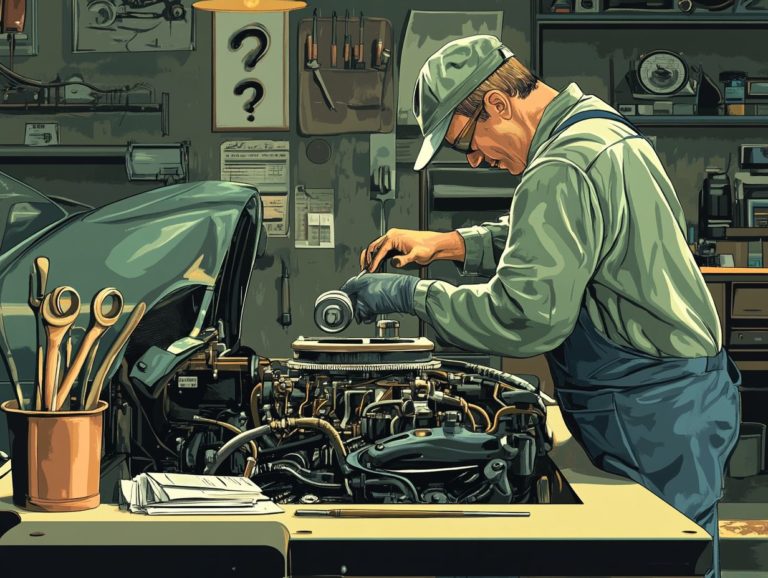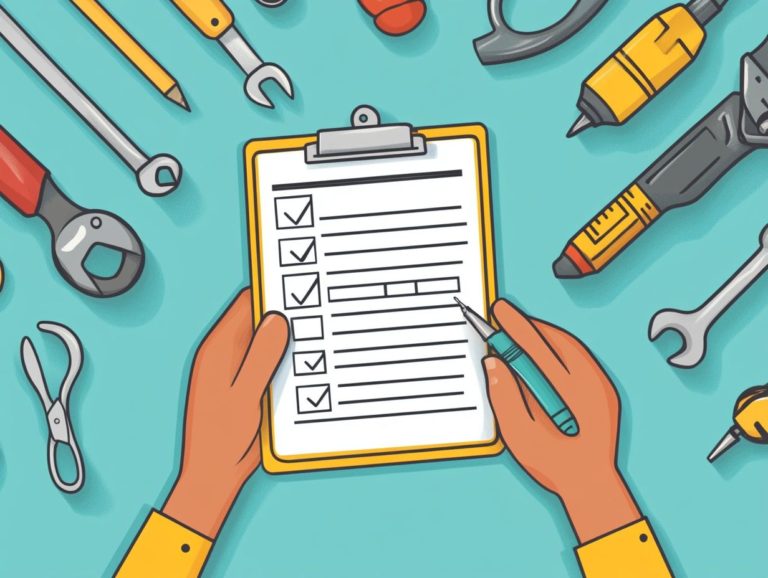What to Do If Issues Are Found During Inspection
Inspections are vital for ensuring safety, functionality, and value, whether you re dealing with a home, vehicle, or business.
By grasping their purpose and the common issues that arise, you can prepare more effectively for the inspection process. This article offers key insights into identifying typical problems and addressing them with precision.
You ll also find valuable tips on collaborating with inspectors and preventing future issues from cropping up. By the end, you ll feel empowered to navigate inspections with confidence and ease.
Contents
- Key Takeaways:
- Understanding the Purpose of Inspections
- Common Issues Found During Inspections
- Addressing Issues Found During Inspections
- Working with Inspectors
- Preventing Issues for Future Inspections
- Frequently Asked Questions
- What to do if issues are found during inspection?
- What are some common issues that can be found during inspection?
- Who should be notified if issues are found during inspection?
- What steps should be taken to resolve the issues found during inspection?
- What are some ways to prevent issues from being found during inspection?
- Can issues found during inspection affect the sale or rental of a property?
Key Takeaways:
Be prepared for issues during inspections by understanding their purpose and importance.
Take steps to address and resolve common problems found during inspections to ensure a successful outcome.
Maintain regular maintenance and check-ups to prevent future issues and ensure a smooth inspection process.
Understanding the Purpose of Inspections
Understanding the purpose of inspections is essential for you, whether you’re a home buyer or seller. It significantly influences the property purchase process.
A home inspection reveals important details about a property’s condition, giving you the power to make informed decisions.
Inspections are meticulously designed to uncover potential issues, such as structural concerns, electrical failures, or plumbing deficiencies.
By enlisting the expertise of a professional home inspector, you ll receive a detailed inspection report that highlights the findings and any safety issues related to the property.
This invaluable information positions you to craft more effective negotiation strategies with the seller, ultimately enhancing your transaction experience.
Why Inspections are Important
Home inspections are crucial for assessing the condition of major systems and spotting potential safety issues.
These evaluations act as a safeguard for both buyers and sellers, ensuring that major problems are found before finalizing a transaction.
A detailed inspection report can help shape your negotiations; you might find yourself requesting repairs or price adjustments based on what the report reveals.
For sellers, fixing safety issues early on can help you sell faster by addressing concerns upfront, which minimizes any last-minute complications.
Ignoring these inspections can lead to unexpected costs and jeopardize the integrity of home warranties, not to mention the overall safety of future occupants.
Common Issues Found During Inspections
During a typical home inspection, you may encounter a range of issues, including common problems associated with major systems such as the electrical system, plumbing system, and HVAC system.
Structural components like the foundation and roof may also show problems that need attention.
Examples of Common Problems
During home inspections, you ll often encounter common issues like electrical wiring problems, HVAC concerns, and foundation irregularities. These problems can vary widely, from outdated wiring that could ignite fire hazards repairs for which may cost you thousands to HVAC systems that struggle to perform.
Foundation cracks are particularly worrisome; they might point to deeper structural issues that, if left unaddressed, could lead to repairs running into tens of thousands of dollars. It s essential to prioritize thorough inspection services, including termite and radon checks. Overlooking these could have serious safety and financial repercussions.
Termite damage can quietly undermine your home s structural integrity, while radon exposure presents significant health risks. Addressing these concerns is vital in the home-buying journey.
Addressing Issues Found During Inspections
Fixing problems found during the inspection is a vital part of the home buying journey. This process often requires you to negotiate necessary repairs, grasp the associated costs, and thoughtfully consider how significant repairs could impact the property’s value.
Taking these steps ensures you make informed decisions that protect your investment.
Steps to Take to Resolve Problems
To fix the problems in your inspection report, start with a clear plan that includes reviewing the inspection contract and negotiating effectively with the home seller.
Begin by examining the inspection report closely to understand the issues. Focus on the most critical repairs, paying attention to safety concerns and costs.
Next, develop your negotiation strategies, which could involve requesting repairs, price reductions, or credits towards closing costs. Keeping open communication with the seller is important; many appreciate the chance to resolve issues peacefully.
Discussing how to handle closing costs can also give you flexibility, helping you make informed decisions that fit your budget while ensuring your new home meets your standards.
Working with Inspectors
Hiring a professional home inspector is crucial to the process. This choice ensures that you, as a homebuyer, receive a thorough and unbiased inspection report, accurately reflecting the property’s condition.
Tips for a Successful Inspection Experience
To ensure a successful inspection, prepare a list of questions for the inspector and share any concerns during the inspection.
This collaborative approach clarifies property details and builds rapport with the inspector, which can help you understand their findings better.
When selecting an inspector, check their credentials, reviews, and experience with the specific type of property you re buying.
After the inspection, review the report carefully and don’t hesitate to ask any follow-up questions.
Sharing your insights with a trusted real estate agent can help you make informed decisions about repairs or negotiations with the seller, ensuring your final purchase aligns with your expectations.
Preventing Issues for Future Inspections
To have a smooth experience during future inspections, prioritize regular maintenance and check-ups.
This proactive approach helps you catch potential safety issues early, keeping your home safe and sound!
Maintenance and Regular Check-Ups
Regular maintenance of key systems like Heating, Ventilation, and Air Conditioning (HVAC), plumbing, and electrical systems is vital for keeping your home in top condition and avoiding large repairs.
By focusing on these areas, you can fix minor issues before they turn into costly problems, extending the lifespan of each system.
For example, routine HVAC inspections can improve efficiency, lower energy bills, and enhance indoor air quality. Keeping your plumbing in check helps spot leaks or blockages early, preventing water damage and extending your pipes’ lifespan.
A well-maintained electrical system reduces fire hazards and prevents unexpected power outages. Staying proactive about property upkeep is not just maintenance; it’s a wise investment in safety, comfort, and significant savings over time.
Frequently Asked Questions
What to do if issues are found during inspection?
If issues are found during the inspection, address them promptly. Ignoring them can lead to more problems and put your safety at risk.
What are some common issues that can be found during inspection?
Common issues include structural damage, electrical problems, plumbing issues, mold or mildew growth, pest infestations, and safety hazards like faulty wiring or loose handrails.
Who should be notified if issues are found during inspection?
If you re a tenant, notify your landlord or property manager immediately. As a homeowner, contact a qualified contractor or repair service to handle the issues right away.
What steps should be taken to resolve the issues found during inspection?
The first step is to assess the severity and urgency of the issues. For minor problems, you might fix them yourself, but for larger issues, hiring a professional is best. Keep a record of all communications and repairs made.
What are some ways to prevent issues from being found during inspection?
Regular maintenance can help prevent problems during inspections. Clean your gutters, check for leaks, and replace worn-out appliances.
Don t wait being proactive saves you time and money!
Can issues found during inspection affect the sale or rental of a property?
Yes, problems found during inspections can impact the sale or rental of a property. Address these issues before listing your property to ensure a smooth transaction.
Avoid costly complications by being proactive!






